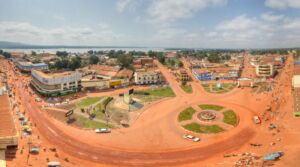Crime and security in Central African Republic

This is probably the most important and most asked question from anyone who is interested in visiting Dzanga Sangha National Park and Chinko National Park or any other place such as Bangui or other places in the Central African Republic. Is it safe to travel to the Central African Republic? The answer is ofcourse a little complicated, as this would of course depend where you would travel to. Most tourists who come to the Central African Republic wish to go on safari to discover the wildlife and nature of the national parks and aren’t planning to go in any dangerous zones, of course. We also get the occasional tourists who have a few days in Bangui and wish to have a day tour in the city center of Bangui and visit the sites near the capital. So we would like to also address the security situation in Bangui as of 2022 – 2023.
While several parts of the country are plagued by violence and banditry as of the ongoing conflicts, traveling to the Dzanga Sangha National Park and Chinko National Park have a lot less risk as you are far away from the conflict zones. Most visitors fly to Bangui and then continue their travel in the Central African Republic by chartered plane or by boat (from/to Cameroon or Congo), which reduces the risk even more if you take a plane. Even though government websites will advise you not to go to Central African Republic and paint Bangui as a war zone, the capital is actually calm and stable right now and one can have an interesting stay with a few nice visits to be had and new friends to be made. This doesn’t mean there are no threats. Just like any other capital there is always a risk of theft and crime, so one must always be vigilant when staying and walking in Bangui. Most of the problems are situated to the north and the east of Bangui. There is a large UN presence in Bangui and you will find many soldiers and police patrolling the streets. Be careful when you are on the street and make sure no one follows you or tries to snatch your phone or wallet.
There are still rebel groups active in the Central African Republic and there is a lack of law. In Dzanga Sangha there has never been any violence against foreigners as it’s completely isolated from the rest of the country. There are also UN troops present near Bayanga.
The Central African Republic has experienced a long period of instability and civil war, characterized by frequent and violent clashes between rival religious and ethnic groups, resulting in many casualties. A peace agreement between the government and the various armed groups was signed in Bangui in February 2019, but its implementation remains problematic. The government does not yet have full control over the entire territory, especially the east of the country is problematic as well as some parts in the north.
Our trips out of Bangui are in calm areas with a good vehicle and you’ll be in good hands.
Given the large presence of security forces, the situation in Bangui remains stable. However, the third arrondissement (« PK5, Muslim neighborhood controlled by autonomous groups) and its neighborhood should be avoided.
Quite a few hotels exist, but the local and international security forces, and we as well, recommend staying at the “Ledger” hotel because it is located in an area of the city that is more systematically guarded by international security forces.
It is also recommended that you make copies of your identity and travel documents and keep the originals in a hotel safe when you travel to Bangui and the Central African Republic as a whole.
Please, know that wildlife tours are not without risk and that wild animals are unpredictable. You have to be cautious and responsible while you are on your safari in the Central African Republic.
Traffic and road conditions in Central African Republic

The roads in the Central African Republic are often in very bad condition, even in Bangui, especially during the rainy season when they become impassable. It is strongly discouraged and very difficult to move outside the capital. There is rarely a functional gas station out of the capital. So it is recommended to provide sufficient fuel reserves if a trip from Bangui is considered. In Bangui there are often fuel shortages and long waiting lines near the gas stations.
On the roads and tracks, the unpredictable behavior of many drivers demands constant attention. It is recommended not to drive at night in the Central African Republic due to road safety and the possibility of police checks. In the event of a serious road accident, it may sometimes be more prudent to keep a low profile inside the vehicle and contact the nearest police station to report the accident. It has already happened that in situations like this, foreign drivers are violently treated by passers-by. Emergency aid is not guaranteed to arrive quickly.
Roads in the Central African Republic may sometimes be cut off by roadblocks (“coupeurs de route”). It is advisable not to resist in the event of such an attack.
Delays on local and regional flights must be taken into account. In the event of conflicts in the capital, it is possible that the flights will be canceled and this will only be communicated at the last minute.
Make sure that you have good insurance when you come to the Central African Republic and that you register yourself with your local embassy or consulate when you arrive at Bangui.
The main international airlines flying to Bangui are: Air France, Royal Air Maroc, Kenya Airways, Air Côte d’Ivoire and the West African Company ASky. There are also frequent direct flights from Kigali – with a stop in Douala (Cameroon) – to Bangui with Rwandair.
Climate and disasters in Central African Republic
A lot of people ask us what the climate in the Central African Republic is and how the weather is. The south of the Central African Republic has an equatorial climate characterized by a succession of rainy seasons (Mid April to June and October to mid-December) and dry seasons. The north is sub-Sahelian with less precipitation.
In the rainy season, sometimes violent thunderstorms with heavy rainfall can erupt, causing damage: flooding of roads and rail network, landslides, subsidence, etc.
Local law in the Central African Republic
As a visitor to the Central African Republic, like the residents themselves, you are subject to the laws of the host country. It is advisable to comply with the laws, decrees and regulations of the country, especially with regard to traffic and the police. Prison conditions are very harsh. A few things to remember:
– Possession and use of drugs are punishable by law.
– It is prohibited to take pictures of government buildings, military installations, airports, bridges, the presidential palace, law enforcement officers (and generally anyone wearing a uniform). It is advisable not to take pictures of people without their prior permission. In villages it is advisable to request the prior permission of the village head.
– Respect the many local customs and customs, pay particular attention to respecting the rules of politeness and observe a certain restraint in the public expression of your beliefs.
– All trade in diamonds and precious stones is currently prohibited by international authorities. The Central African government has committed to contribute to the implementation of that ban. Illegal trade in gemstones is nevertheless driven by or for the benefit of armed groups and militias – foreigners who interfere can expose themselves to life-threatening conditions.
Payment methods and currency in Central African Republic
The local currency of the Central African Republic is the Central African Franc (CFA). Cash is the usual payment method. This currency is in theory convertible because it is linked to the euro. In practice, however, it is better to exchange FCFA on the spot. It is possible to withdraw money with a credit card at the hotel Ledger as well as at the Ecobank in the city center. It is impossible to withdraw money outside of Bangui. Paying with a credit card is impossible in most of the Central African Republic. It is therefore highly recommended to bring enough cash (Euros or dollars) to change in Bangui.
As of April, 2022, Bitcoin has become a legal currency in the Central African Republic. It is still unclear how this will be integrated in daily life, but we at Central African Travel and Tours are proud to say we’re the first travel agency in Africa to accept crypto payments such as Bitcoin and Ethereum for those wishing to book a safari or travel.
Travel insurance for Central African Republic
You should make sure that your health insurance company’s insurance sufficiently covers the risks related to your destination and mode of travel. An adapted travel insurance with comprehensive coverage is an absolute must (medical care and repatriation, if necessary, legal assistance) when you travel to the Central African Republic.
GSM and communication facilities in Central African Republic
The operators operating in Bangui are: TELECEL / MOOV / ORANGE / AZUR / SOCATEL. It is important to make sure that the GSM provider has activated roaming for foreign countries, especially for Africa. Very high rates are charged for calls from foreign numbers. It is quite easy to purchase a SIM card locally to call your country from the Central African Republic at a lower rate. Travelers who wish to travel to remote regions outside of Bangui can purchase a satellite phone if they wish. However, the rates are high.









